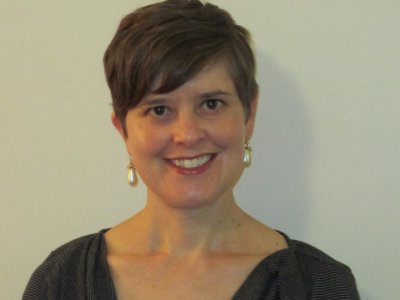Clarissa Gaff ’00

Clarissa Gaff graduated from Goshen College with a English major and History minor in 2000. She is currently a staff attorney at Land of Lincoln Legal Assistance Foundation.
1. Why did you choose to come to Goshen College for your undergrad?
To be honest, Goshen was not my first choice of schools. I grew up in the Mennonite Church, but I was completely resistant to attending a religious college, particularly one that my parents attended and was close to home.
I ended up really loving GC. My fellow students were fun, inquisitive, and socially conscious. My professors were caring and engaging. As for the religiosity that I feared, Goshen instead allowed me to fully explore what it meant to be a Mennonite in an environment that was informed and nurturing, yet critical and always self-examining. That leafy spot in Indiana proved to be a tremendous foundation for the rest of my life.
2. What inspired you to pursue a career in law?
Much like my decision to attend Goshen College, law was not my first choice. After college, I spent a year in Pittsburgh participating in the PULSE program, working for an environmental group and a labor union. At the labor union, I loved working in the research department, trying to ascertain the Achilles heels of particular large corporations, so the union could exploit their weaknesses and force them to bargain with its workers. It inspired me to look at labor studies and public policy programs. I wanted a degree that would allow me to look at a variety of careers. The lawyers at most of the nonprofits I interned at, enjoyed a lot of power, as well as opportunities to inform or make important decisions. Most of the lawyers told me, “Don’t become a lawyer if you want to change the world.”
Ever stubborn, I didn’t think they knew what they were talking about, so I went to law school anyway. I was certain that my law degree would empower me to become the research director of a labor union. While in law school, I determined that I really enjoy working with clients. A stint at legal aid demonstrated to me that low income folks in America not only face scores of injustices on a daily basis, but that they are largely without advocates in a civil justice system that terrifies them and can impose serious consequences on their lives—taking away their children, evicting them from their homes, garnishing their wages, imposing fines. I was not naïve enough to think my representation of low income folks would end poverty or lead to an end of inequality, but in a lot of ways, I subscribe to the maxims articulated in Emily Dickinson’s poem, If I Can Stop One Heart from Breaking.
If I can stop one heart from breaking,
I shall not live in vain;
If I can ease one life the aching,
Or cool one pain,
Or help one fainting robin
Unto his nest again,
I shall not live in vain.
Thus, when offered a job out of law school at Land of Lincoln Legal Assistance Foundation, which provides free civil legal services to low income individuals in 65 counties in Illinois, I happily accepted a position as staff attorney and have never looked back. It’s kind of the emergency room of legal practice, and sometimes I feel like I’m applying band-aids to gunshot wounds. But it is also deeply, deeply satisfying when you can prevent an elderly couple from being foreclosed on, or keep a person with schizophrenia from being evicted from subsidized housing, or help a victim of domestic violence permanently escape her abuser.
3. How has a History minor at Goshen College shaped the work that you are currently doing?
Goodness, being a history minor prepared me for law school and the practice of law in innumerable ways. First, I think the history classes I took developed a lot of analytical skills in me that I lacked. And all my classes developed my writing ability. I also think they prepared me for the Socratic method, a method of questioning employed by law professors and judges alike.
But I think more importantly, my history classes taught me to closely read material, something very important in the practice of law. Carefully reading statutes and regulations is imperative to robust representation and argument in the legal system. And being a history minor instilled in me a healthy curiosity as to why we have certain laws, in what historical context they were written and why, and what are the long term consequences of some of them.
4. What advice would you have for current GC history majors and minors?
Do the work. Seriously. Don’t try to skate by with minimal effort. All that reading and writing and critical thinking is so, so, good for you, for so many reasons.
Additionally, think expansively about careers and what really motivates you. When I graduated from GC, a career in academia looked very romantic and alluring, but I was also very aware that I probably didn’t have the intellectual chops, nor the work ethic and self-motivation to complete a PhD. So I tried lots of things, and didn’t rush into graduate school immediately. If you have the opportunity to do PULSE or work for MCC, seize it, because they give you a chance to explore your passions, without incurring lots of student loans.
Talk to people who have careers in fields you are thinking about, because they can give you the lowdown on what their work requires and how they got where they are. They can explain what are the great things about their job, and what are the terrible things their work requires. Not everyone needs a job to be their life’s work and taps into their passions, but I did, and I needed a lot of time and trial and error to figure it out.




